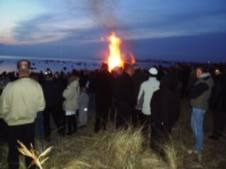It’s April 30. Happy Walpurgis Night, my friends!
Here, on the far side of The Pond, we’re missing out on some great fun. How about we bring back some of the old world traditions of tonight and tomorrow?
Tomorrow is May Day, also called Beltane, throughout much of Europe. Tonight, Walpurgis Night, is the eve of Beltane, the joyful festival of growth and fecundity that heralds the arrival of summer. It is the festival of the ‘Good Fire’ or ‘Bel-fire’, named after the solar deity Bel.
Lighting fires was customary at Beltane, and traditionally a Beltane fire was composed of the nine sacred woods of the Celts. All hearth fires were extinguished on Beltane Eve and then kindled again from the sacred “need fires” lit on Beltane. People would leap through the smoke and flames of Beltane fires and cattle were driven through them for purification, fertility, prosperity and protection.
It is a traditional time for Handfastings (marriages), and was a time for couples to make love outside to bless the crops and the earth. Maypoles were often danced around at Beltane to bring fertility and good fortune. The ribbons which were wrapped around the pole by the dancers brought a sense of the integration of male and female archetypes, mirroring the union between the God and the Goddess. Beltane lore also includes washing in May-day dew for beauty and health, and scrying in sacred waters or crystal balls.
But that’s tomorrow. Tonight, exactly six months’ distant from All Hallows’ Eve, the supernatural once again rules. On Walpurgis Night, witches ride their broomsticks through the sky, and the natural world is forced to confront the powers of the supernatural. According to ancient legend, this night was the last chance for witches and their nefarious cohorts to stir up trouble before Spring reawakened the land.
Like Halloween, Walpurgis has its roots in ancient pagan customs, superstitions and festivals. At this time of year, the Vikings participated in a ritual that they hoped would hasten the arrival of Spring weather and ensure fertility for their crops and livestock. They lighted huge bonfires in hopes of scaring away evil spirits.
The name “Walpurgis” comes from a woman named Valborg who founded the Catholic convent of Heidenheim in Wurtemburg, Germany. She later became a nun and was known for speaking out against witchcraft and sorcery. She was canonized Saint Walpurga on May 1, 779. The celebration of her sainthood and the old Viking festival occurred around the same time; over the years the festivals and traditions intermingled until the hybrid pagan-Catholic celebration became known as Walpurgis Night.
In Germany, the witches were said to congregate on Brocken, the highest peak in the Harz Mountains – a tradition that comes from Goethe’s Faust. Brocken is also known for the phenomenon of the Brocken Spectre, the magnified shadow of an observer, typically surrounded by rainbow-like bands, thrown onto a bank of cloud in high mountain areas when the sun is low.
A scene in Faust Part One is called “Walpurgisnacht”, and one in Faust Part Two is called “Classical Walpurgisnacht”. The last chapter of book five in Thomas Mann’s The Magic Mountain is also called “Walpurgisnacht”. In Edward Albee’s 1962 play Who’s Afraid of Virginia Woolf?, Act Two is entitled “Walpurgisnacht”.
In some parts of Germany, the custom of lighting huge fires is still kept alive to celebrate the coming of May, while most parts of Germany have a derived Christianized custom around Easter called “Easter fires.”
The Czech Republic celebrates April 30 as the “burning of the witches” when winter is ceremonially brought to the end by the burning of rag and straw witches or just broomsticks on bonfires around the country. The festival offers Czechs the chance to eat, drink and be merry around a roaring fire.
In Estonia, they call it Volbriöö and celebrate throughout the night of April 30 and into the early hours of May 1, a public holiday called “Spring Day.” Here too, the night originally stood for the gathering and meeting of witches. Modern people still dress up as witches to wander the streets in a carnival-like mood.
In Finland, Walpurgis day (Vappu) is, a big carnival-style festival that begins on April 30 and carries over to May 1. They drink large quantities of sima, sparkling wine, and other alcoholic beverages. Student traditions, particularly those of the engineering students, are one of the main characteristics of Vappu. Since the end of the 19th century, students and university alumni wear a cap; some caps, such as worn by engineering students and nurses, have pom-poms hanging from them. In Helsinki, and its surrounding region, they have the fixtures include the capping (on 30 April at 6 pm) of the Havis Amanda, a nude female statue.
In Sweden, it’s all but an official holiday. Walpurgis Night bonfires, which are supposed to be kindled by striking two flints together, are seen on many hills. Farm animals are let out to graze, and the bonfires are meant to scare away predators. Singing traditional songs of spring is widespread throughout the country. During the day, people gather in parks, drink considerable amounts of alcoholic beverages, barbecue and generally enjoy the weather.
So how about it? We deserve this kind of celebration too! Let’s cast a vote for the first presidential candidate who promises to declare Walpurgis Night a national holiday in America!



